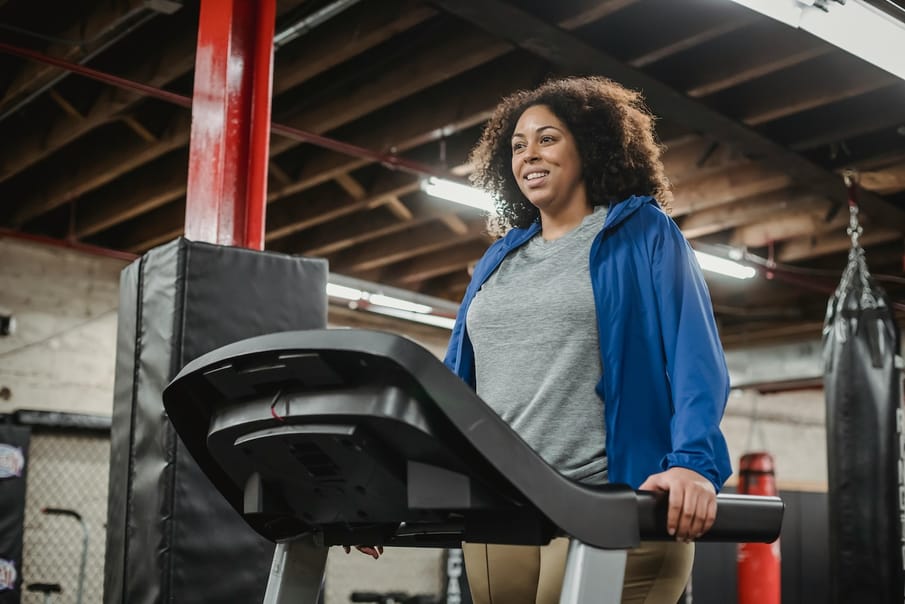Working out isn’t reserved for a certain type of person or body. Here, columnist Michelle Elman highlights the ways gymtimidation can get under our skin, and, crucially, how to reclaim our right to exercise
While I’ve been working out regularly since I was 19 years old, people are often shocked when I say this because I do not have the stereotypical ‘gym body’. But the truth is there is no such thing as a ‘gym body’.
This societal judgement is often a key component in why people can be put off exercising, or feel intimidated and unwelcome in the gym – AKA ‘gymtimidation. We have been taught that one of the main reasons to move our body is for aesthetic results, and so when someone like myself says they work out, it often comes with the assumption that you must either be lying or doing it wrong in some sort of way.
This can present itself in subtle and insidious ways; it might be when I’m doing an exercise in the gym, and someone will walk over to offer unsolicited advice assuming I’m inexperienced. Or, for example, when I was doing a personal training session with a new instructor who asked me to do an exercise, and when I said I couldn’t, told me that this was the kind of attitude that would get me nowhere. They had clearly made assumptions based on the stereotype that ‘fat means lazy’, and leaned into it without stopping to ask why I said I couldn’t.
In this instance, the reason I couldn’t do that exercise is the same reason I started exercising in the first place. I’ve had 15 surgeries in my life – from dealing with a brain tumour to punctured intestines, obstructed bowels, and a cyst in my brain – and there are ways I am limited in the exercises I can do. I couldn’t do a plank because my stomach had been cut into 15 times, and with such extensive abdominal surgeries, when I do a plank, my shoulders take the burden which leaves me in pain.
I know my body, and over the years have learned to advocate for it in order to not cause injury, but it still frustrates me that we push this narrative of mind over matter, rather than listening to our bodies. Advocating for your body is the first place to start overcoming gymtimidation. Instead of internalising the messages of society, or listening to people who might make comments about the way you work out, I want you to start thinking: ‘How dare you?’ How dare you judge me when you have no clue what I’ve been through? How dare you judge me when you have not lived a day in my life? How dare you judge anyone for trying something new, and thinking you are superior simply because you might have more experience, or because you grew up in a world where your body type was more accepted? I’m not saying that you have to vocalise it, but when you think ‘How dare you,’ it swaps from internalising their opinion to questioning it.
When someone approaches me in the gym and corrects me, or makes a comment on the way I am working out, the message that I keep at the forefront of my mind is that it is their projection, and it is usually an indication of their relationship with exercise, more so than me specifically.
At the end of the day, if you pay for a gym membership, you are entitled to the space in the gym as much as the next person. You do not need to be a certain size or aesthetic, or be an expert on all the equipment, to belong, because it is not their space to declare whether you are welcome or not.
Gymtimidation arises when we feel insecure, and allow this to dictate where we can go, what we should be doing, and whether we have the right to take up space. Within the gym, that can be apologising if you take too long on a machine, or moving out the way because, unconsciously, you believe someone else’s workout is more important than yours. Take your time, and take your space – they can wait. You deserve to be able to move your body at your own pace.
The largest issue with gymtimidation is it takes away from the joy of exercise. We get consumed by fear, and spend the time there worrying about what other people are thinking about us as opposed to how we feel.
The best way to counteract this is to start questioning all the rules or unspoken messages you have been taught around exercise. Detach it from nutrition, and compensatory behaviour around food and diet culture. You do not need to work out for an hour for it to count. You do not need to keep doing an exercise if you hate it. You are allowed to take breaks. Moving your body at home or in your job is just as valid, and the gym is not the only place that moving your body counts. A chilled workout is just as important as a high intensity one, and the best exercise for you is the one you love the most.
Subscribe to Happiful to make sure you don't miss out on Michelle's fantastic regular column!


Comments